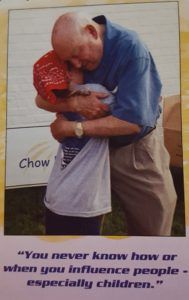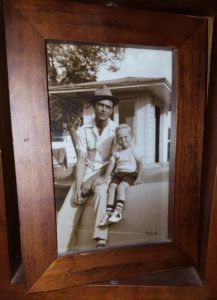
In This Issue
- “The Church and Its Members (1st Timothy Chapters 2-3)” (New King James Version) by Sarah Crawford
- “The Church & Its Minister (1st Timothy Chapter 4)” by Hannah Clark
- “The Practical Appeal (2nd Timothy Chapter 2)” by David Bushnaq
- “The Personal Appeal (2nd Timothy Chapter 4)” by Sarah Crawford
“The Church and Its Members (1st Timothy Chapters 2-3)” (New King James Version)
By
Sarah Crawford
At the beginning of chapter two and end of chapter three, Paul makes an address for all the brethren on the purpose and goal of the church’s conduct.
Chapter two verses 1-4 explain God’s desire for all to be saved and the members role in making supplications, prayers, and interceding on behalf of all people so that we might live a peaceable life in godliness. Later in chapter three verses 14-16 Paul again describes that he has written all these things so that the brethren would know how to conduct themselves in the church for the glory of God. The rest of the scriptures between these two passages go into further detail on how the brethren can specifically fulfill this exhortation from Paul.
Chapter two (vs. 8-15) describes the roles men and women have within the church. It even goes into detail on what they should and should not participate in, which indicates that God has strict expectations in these specified areas. Men are instructed to “pray everywhere, lifting up holy hands, without wrath and doubting” (vs. 8). This may only be one verse, but there are many concepts described here. Praying everywhere may involve praying in different countries, cities, homes, and can even mean in all areas of an individual’s life. Sometimes we restrict our prayers to times when we are in the comforts of our homes or gathered with brethren, but we must also take confidence in our faith to pray when we are uncomfortable or it is unpopular to do so. This could be at work, with our non-faithful families/friends, or even in an unfamiliar environment around strangers. “Lifting up holy hands” is not a common phrase we use today, but we can understand that how we present ourselves must be with holiness/godliness. This does not mean we are perfect, but rather that our hearts must be sincere in our desire to be pleasing to God. We work towards this by studying His word, embracing the love Christ demonstrated for us, and bearing our burdens with one another to encourage and edify our brethren and non-faithful peoples. “Without wrath and doubting” may seem obvious, but it can be a real struggle for many people. Paul does not say without wrath and doubting over the big problems. We have to practice humbling our hearts and trusting in God so as not to allow our hearts to become wrathful against others over anything, big or small. In my experience, it is not the big things that I have trouble handling, but it is the small things that happen over and over again that wear me down and can corrupt my heart. It may be something as simple as my brothers not replacing the toilet paper roll, but if I am not careful, my heart can become unjustly angry and I can let that anger fester in my heart to the point that I am not leading a godly lifestyle.
These instructions for the men of the church also apply for the women as Paul says in the next verse (vs. 9), “in like manner also”. The next verses on women’s apparel has been interpreted different over time, but I think it is a simple instruction on how women present themselves based on what is in their hearts. It is not wrong to wear jewelry, nice clothes, or braid our hair, UNLESS we do it with the intention of flaunting ourselves. When our hearts are focused on self-serving instead of serving God in good works and holiness, that is when it can become ungodly. Our focus, as women in the church, is not to give glory to ourselves, but to give glory to God in the work He has blessed us with. Today’s culture does not favor the next verses on a woman’s silence and submission in the church because it is often misread with emotional bias. The statements in the next verses are not meant to be offensive, but to give guidance to women on how they can please God in their roles in the church. One good explanation I have heard for women’s silence in the church is this: God calls men to step up and be leaders of His flock while He calls the women to train up the children and practice self-control and submission within the church. These two roles, for a majority of individuals, contradicts their natural inclinations. Many men in the church I have observed tend to be quieter or more conserved in their leadership approaches while many women have input on a lot of things they would like to see changed or addressed. God’s commands for men and women’s roles in the church challenge both sexes to grow in areas they may not be naturally inclined towards. Many women are not naturally good at keeping their thoughts to themselves, unless they practice and train their hearts to allow the men to be leaders. And likewise, many men might defer to their wives at times because it is easier. I know, for myself, I find it challenging to give in on a discussion if I think I have a better position, but sometimes I need to step back and let the man take control so that I can protect his heart as well as my own and that we do not create an unloving atmosphere within the church. Keeping in mind the goal Paul charges us with, to live peaceable with all men, this requires also that the world can see us living peaceably with other members too.
Chapter three discusses two potential leadership roles that the men of the church may aspire to: bishop (overseer) and deacon. Many of the qualifications for these two positions are similar with some noted exceptions; one that deacons must be tested prior to taking on the position. A deacon must also have a wife who is found blameless as he is, which is not indicated with the position for bishop. It is important to note that the word “bishop” as used in the bible is not the same as the bishops we see today in the Catholic faith. The biblical bishop is an overseer of a local congregation working with the members to care for their spiritual needs and must have good standing with the brethren and those outside the church. It is not an unbroken line of charism passed down by the laying on of hands, but rather, it is a position that any faithful man may aspire and work towards. There is no age limit, but the man must not be a novice in the faith and it states in this passage that to qualify as a bishop the man must be married to one wife and rule his house well. These qualifications are important because they automatically single out individuals who are strong in the faith and have demonstrated the ability to lead a family before guiding God’s church. Verse 13 states that these individuals gain good standing and great boldness in the faith, but it requires a great degree of responsibility on their part as they must actively seek to build and encourage the brethren so that others grow to be of service to God and the church. While it is easy to read through these chapters quickly, there is much that we can glean and apply to our personal growth and how to encourage those around us and in our local congregations.
“The Church & Its Minister (1st Timothy Chapter 4)”
By
Hannah Clark
Upon first reading this title, you may think that chapter 4 of first Timothy is in regards to the congregation and its preacher. The section headings in my Bible read “a good servant of Jesus Christ” and “take heed in your ministry” which has a more personal feeling to it. What I needed to remind myself is that this book of the Bible is a letter from Paul to Timothy which means we are essentially reading someone else’s mail. Some of the verses are particular to things happening at that time in history while other verses can easily be applied to us today. My goal in this article is to try and focus on the latter.
Paul begins this part of the letter as warning Timothy that there will be those that will leave the faith due to false doctrines (4:1) which can be seen in the world around us today due to all the varying religious teachings. To combat this, Paul tells Timothy to “exercise yourself toward godliness.” In their time, they only had the Old Testament writings and letters of what we now have in the New Testament. We are blessed to have the Bible readily at our fingertips by means of our phones or a book so that we may more easily gird with the “sword of the Spirit” (Ephesians 6:17).
Verse 10 states how Paul and Timothy “labor and suffer reproach” for their faith in God. This is still true today. Jesus Himself was “despised and rejected” (Isaiah 53:3) and Paul even mentions in his second letter to Timothy that “all who desire to live godly in Christ Jesus will suffer persecution” (2 Timothy 3:12). It can be discouraging to want to try and teach others due to the backlash that we may face. In this, I am reminded of what the Lord told Samuel in the Old Testament, “for they have not rejected you, but they have rejected Me…” (1 Samuel 8:7).
We know Timothy is a younger teacher based on verse 12 but is told to “be an example to the believers in work, in conduct, in love, in spirit, in faith, in purity.” Many know the phrase to “talk the talk and walk the walk” and that’s true in our lives as Christians. In ministering to others, how we follow through with what we teach has a big impact on how others receive the Word of God. I’ve heard so many stories from others that want nothing to do with God, faith, and the Bible due to the hypocrisy of other “Christians.” On the flip-side, I’ve also heard accounts of those that have come to the Lord through the example of another (which leads people to ask questions and want to know more about Christ). Just because Timothy was a younger teacher didn’t make him a less effective minister to others and if we are using Christ as our guide, we won’t go astray in helping others.
Paul finishes this part of the letter (our chapter) by encouraging Timothy to continue in the doctrine they are teaching (which is of Christ). This is a lead-in to the last two chapters of this book in which Paul finishes up his letter to Timothy on how brethren should treat one another. Paul says that in continuing in the doctrine of Christ, Timothy will “save both [himself] and those who hear [him]” (4:16). None can come to salvation without Jesus Christ and our ministering to Christ through the teaching of His word will save others too. Jesus said Himself “I am the way, the truth, and the life. No one comes to the Father except through Me” (John 14:6). It is up to us to know the gospel so that we can share it with others so that they may have a hope of eternal life in heaven.
To conclude, this section of Paul’s letter to Timothy reinforces how the older of the congregation are to teach the younger so that we all would be “thoroughly equipped for every good work” (2 Timothy 3:17). By reading and studying the gospel, we are better prepared to ministers ourselves to Christ and teach others. We will also be better equipped to bring others to Christ not only by our words, but also by our deeds.
“The Practical Appeal (2nd Timothy Chapter 2)”
By
David Bushnaq
2 Timothy 2 is a chapter that speaks of the future of the church. It begins with Paul telling Timothy to be strong in the grace that is in Christ Jesus. Timothy is told that because Paul gives him the charge to find
those who will be teachers, which then teach others so they also can one day be teachers.
Before he can teach others, first Paul tells him the prerequisites he must follow, himself.
He must not allow himself to be entangled with the world to the detriment of his growth, rather he must – as if he was competing in a sport or race – confirm he abides by the rules of the bible so he is not
disqualified from the crown that awaits him, and all who live godly lives.
Now these concepts are not strictly for him, but for all Christians. The examples given imply that his competing isn’t private. Neither should ours be. Those not only in the congregation, but in the world around us should know that we are Christians, that we too strive for the crown.
For one to undergo such a task of finding teachers, one must be strong in the grace. Teaching others in error will almost certainly lead to them also teaching error, and congregations that allow teaching in
errors lead their members to destruction.
How does one demonstrate their strength? By having the ability to “rightly divide the word of truth”, or to accurately handle it. The word “rightly divide” in the Greek means “to cut straight” as if from a guide.
Which means he must be able to, from the guide of the bible, handle disputes or conflicts that may arise.
He must “shun profane and idle babblings” which, of course, suggests that he has the ability to discern what is or is not “idle.”
Timothy also has to demonstrate a different kind of strength as well. He has to find faithful men who also can teach others, and that means he must be able to determine he who also demonstrates a similar strength, or who can be encouraged to reach that strength.
Churches die when men, strong in the faith and knowledge of God’s word, fail to continue the work of those before them in teaching and sharing what they’ve learned. If we do not share our understanding of the bible with those of the next generation, who would? And how could we encourage a better understanding of why what the bible says is so?
There is much being taught about the bible, and just about as much of it is untrue. We may know it, but do the children of our congregations? If they’re told something that is untrue but it sounds or feels good, are they firm enough that they can refute the error?
Paul tells Timothy to search for those able to teach others, but it’s not only those in the congregation who must teach, but the parents as well. Like Timothy was taught by his mother and grandmother, parents must regularly discuss the bible with their children so when the time comes they, as the next generation, can step in. If our parents show a lack of care in the bible and the study of it, in most cases, we will too.
With all of these tools [and more] at our disposal as the next generation {and the generations after mine} there are no excuses for those who are not growing and preparing to support the church when the time comes. This is no mere theory. Godly churches remain so with this pattern. So I challenge you as parents to challenge your kids. Ask them biblical questions and if they don’t know the answers, discuss it with them. Discuss it with book chapter and verse, so when the time comes, they can do the same.
Thank you for reading.
“The Personal Appeal (2nd Timothy Chapter 4)”
By
Sarah Crawford
This chapter starts off with one of the famous sayings by Paul when he charges Timothy to “preach the word; be ready in season and out of season; reprove, rebuke, and exhort; with complete patience and teaching” (vs. 2). These instructions are part of Paul’s farewell to Timothy as he knows that there is little time left in his earthly life. Verse 9 is where Paul begins his personal plea to Timothy, urging him to visit soon as time is drawing near for Paul’s death. In this last chapter, Paul concludes the letter with many words of parting directed to specific people. We do not know a whole lot about some of these people, but it is clear that they had significant importance in Paul’s life for him to mention them by name. Luke is the only one with Paul at this point and Paul gives Timothy instructions to bring Mark with him when he visits. This is interesting to see Paul’s change in disposition towards Mark. If we recall, John Mark was chosen by Barnabas to go on a missionary trip with them (Paul and Barnabas) and Paul refused to take Mark because he had abandoned them on a previous missionary journey. Paul was so adamant about not bringing Mark that he and Barnabas went on separate missionary trips instead of traveling together (Acts 15). Yet now we see that Paul calls Mark out by name and says “he is very useful to me”. It is unclear what changed, but there was such a growth in Mark as a worker for God’s kingdom that Paul wishes him to visit in his last days.
Paul gives context for the location of a few people in the next verses by making simple statements as to where they currently are or have been sent. This gives us topographical placement for people while looking at the big picture. It also communicates to Timothy Paul’s current relationship with some of these individuals. For example, in case Timothy was not aware, Paul lets him know that Demas had abandoned him because of his love for the world. Paul also communicates how Timothy should respond if he comes across these people in verse 14 when he states, “the Lord will repay him for his deeds” referring to Alexander the coppersmith who had worked great harm against Paul. He goes on to defend to the people who deserted him when they faced great persecution and tells Timothy not to hold it against them. This is important for Timothy moving forward because we see Paul as a great support and brother to Timothy, but as he is soon to die, Timothy will face situations where he may not have any support from brethren. Paul strengthens him by encouraging him to find strength and courage in the Lord and be confident in the message of God.
Paul ends the letter with final greetings for Prisca, Aquila, and the household of Onesiphorus and greetings to Timothy from Eubulus, Pudens, Linus, and Claudia by name. Paul also encourages the brethren in Rome to greet Prisca and Aquila (Romans 16:3). It is clear that from the multiple mentions of these two that they are very dear to Paul. Earlier in this letter, Paul blessed the household of Onesiphorus for the kindness and generosity shown to Paul regardless of his chains (2 Timothy 1). It goes on to say that Onesiphorus “searched for me earnestly and found me” while he was in Rome. Paul was being persecuted for his beliefs and those who associated with him were also in jeopardy for facing persecution, yet Onesiphorus not only stood by Paul, but sought him out amongst the persecution. This takes a great deal of love and faith in God so it makes sense that he would be one of the few people Paul wishes to send final greetings to. Paul mentions brethren who send their greetings to Timothy, in my opinion, as a way to further encourage Timothy and build his confidence that there are those who will support him once Paul is gone. Paul mentions again at the end for Timothy to come visit before winter, indicating how eager Paul is to see Timothy one more time. The last farewell is “The Lord be with your spirit”. Paul does end many of his letters with similar farewells, but this seems to target Timothy’s weakness. We see earlier Paul’s encouragement for Timothy to preach even though he is younger and not let others discourage him. As a younger brother, Timothy has worked to find a balance between teaching older brethren and still be respectful to his elders, while always serving God. It seems as if Paul is praying that the Lord strengthens Timothy’s spirit to preach as instructed at the beginning of this chapter; “in season and out of season”. This is one great take-home message for us as there are different situations where others may accept God’s word and others may assault us for speaking the truth. But as Paul says, we must “not be conformed to this world, but be transformed by the renewal of your mind, that by testing you may discern what is the will of God, what is good and acceptable and perfect” (Romans 12:2).


